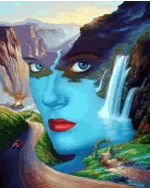The key to the ancient or modern savage world-view is in understanding that a modern person views the world as an “It” whereas the older view personifies everything as a “Thou.”
To the primitive mind, human life was imbedded in nature and dependent on surrounding forces that had wills and purposes of their own.
The “Thou”, whether it is an animal or a river, is a fellow-creature of which the person receives an impression. This knowledge is direct, emotional, and inarticulate, it is not intellectual knowledge. To ancient man “Thou” is a live presence. It has the unpredictable character of an individual. “Thou,” moreover, is not merely contemplated or understood but is experienced emotionally in a dynamic reciprocal relationship. This does not mean that primitive man, in order to explain natural phenomena, imparts human characteristics to an inanimate world. Primitive man simply does not know an inanimate world. Any phenomenon may at any time face him, not as “It,” but as “Thou.”
Primitive man, when he looks for a cause of something, looks, not for the “how,” but for the “who.” He does not expect to find an impersonal law regulating a process as a modern person might. He looks for a purposeful will committing an act.


